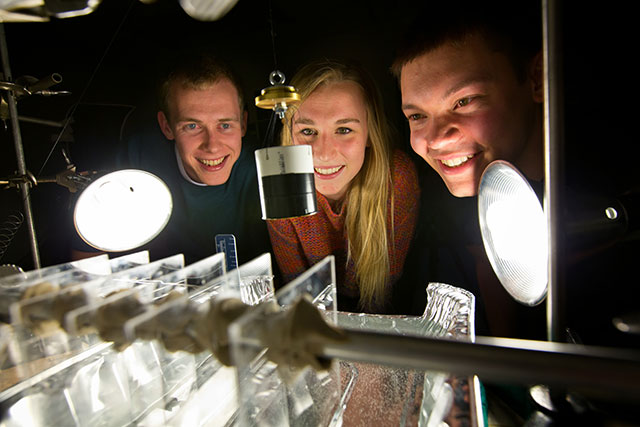Page 63 • (640 results in 0.092 seconds)
-

By Michael Halvorson, Benson Family Chair in Business and Economic History The following excerpts were gathered from an April 24, 2018 conversation between Michael Halvorson, PLU student Teresa Hackler, and Economics professor Karen Travis. Hackler and Travis completed a Benson Summer Research project together in…
school in Public Health. I am currently waiting on training to become a state health insurance benefits adviser while also working as a CNA. I am excited about a career in culturally sensitive, community-based health initiatives. I love the idea of combining how the history of unique populations intertwines with modern approaches to providing the safest, most effective healthcare.” Halvorson: “I’ve really enjoyed working with you two. As administrator of the Benson fellowship program, I get to see
-
A year of achievement and a Decade of Change Dear Colleagues and Friends, It is a great joy for me to welcome each of you to University Fall Conference as we prepare to launch the 2010-2011 academic year, the 121st year in the life of…
on campus. KPLU’s trophy case expanded once more with significant awards and record listenership. Executive Director Greg Brewis and his staff in University Communications are on the move, and the transition to flash messaging and a Web-based communications platform is well under way. If you have been watching, you will note our Web sites features new design, enhanced content and smoother functionality as we bring the PLU story to thousands of prospective students, donors, alumni and friends
-
Learning perspectives About a dozen students silently sit in a semicircle around a Makah woman, as she shows them how to make a cedar bracelet. Students mimic her as she holds several foot-long strands of cedar bark strung out from her mouth to her hands.…
authority that is uniquely based on their background. A big part of the study away program is for the students to learn how to recognize what created those varied perspectives – the people they met and the stories they heard helped guide that. “It’s a real important principal in anthropology,” he said. “There is no one Makah perspective any more than there is one American perspective.” Huelsbeck’s course has created a unique relationship between himself the tribe and PLU. Beginning as a graduate student
-

Mark Lee, Mimi Granlund and Matt Hubbard and the apparatus they built to help them understand how the roughness and size of a tongue would affect the amount of water an animal could lap up and still be efficient. (Photos by John Froschauer) What exactly…
time of her presentation she was waiting nervously to hear whether she would get a job as a data analyst at Seattle-based Horizon Air. She credited this physics capstone – she had to do two others to complete her triple major – with catching the attention of the human resources department at the airline. Every spring, hundreds of PLU students go through the drill of final projects, called capstones. But these research projects, works of art, or music compositions are much more than a final box to
-

TACOMA, Wash. (Oct. 15, 2015)—Resilience is characterized by the “power or ability to return to original form” after being “bent, compressed or stretched.” You see examples of resilience in the news all the time—in the exhausted yet determined faces of Syrian refugees, in the grace of forgiveness following…
unspeakable violence—and in the community, classrooms and concerns of Pacific Lutheran University. That’s especially true this year, as PLU’s 2015-16 Spotlight Series focuses on Roots of Resilience, based on a quote popularized by Martin Luther King Jr. and inspired by Martin Luther: “Even if I knew that tomorrow the world would go to pieces, I would still plant my apple tree.” Dozens of campus events, ranging from a one-man play about a brother’s death from AIDS to February’s Wang Center Symposium, will
-

When we first catch up with environmental advocate Andrew Schwartz ‘07, he’s preparing for a massive road trip with his wife, Emily, and 8-month-old daughter, Maja. They’re headed east to visit Emily’s family in Illinois. But the 36-year-old Schwartz’s life has also been a journey,…
in the eco-ministry field, facilitating spiritual and religious action on environmental and climate justice. It doesn’t just rely on religious foundations, however. The center engages secular and faith-based environmental leaders for education, outreach, support, and action. CEE is creating “incredible spaces where people from all walks of life come together for problems and solutions, while cultivating beauty and a sense of community,” he says. “It keeps me coming back to embrace the struggle
-

In January 2006, a group of PLU students — bundled up in warm coats, gloves, hats and sturdy boots — stepped carefully from the boat on which they’d been traveling onto the rocky and icy shores of Antarctica. This intrepid class helped seal a spot…
January term in Uruguay, spring semester in Granada, Spain, and then for a fall semester I was in London. I was aware of study away in high school, and I was going to make it happen no matter where I went to college, but I really liked the idea of J-term at PLU, that there were so many options, and that study away was such a priority here. Studying away my first year: I did Uruguay my first year, and there were a lot of good lessons to learn. I had different expectations based on a couple of trips I
-
If season two of Sanditon showed us anything, it is that the eyes are easily deceived. After a season full of emotional manipulation through gaslighting and rakes disguised as men of gentility, the final episode retained a few surprises, including the revelation that Charles Lockhart…
Sanditon specifically, does chart an overall rise in depicting and celebrating Afro-textured hair in cinematography after decades of discrimination in Hollywood and mainstream media. In fact, this Sanditon episode arrived not quite a month after the US House of Representatives passed the CROWN Act (Creating a Respectful and Open World for Natural Hair Act) for the second time. Although the Senate has yet to pass it, the move would finally make discrimination based on hairstyle and texture illegal at
-

By Zach Powers PLU Marketing & Communications TACOMA, Wash. (Dec. 21, 2014)—All over the world, Pacific Lutheran University alumni are serving in a wide variety of roles in hospitals, clinics, research centers and public-health agencies, sharing a steadfast commitment of delivering world-class medical care, treatment and…
allows me to help people, and thankfully social work provides many avenues to explore that. I think I still am exploring it. What do you enjoy most about your work? I love the opportunities within social work to do ANYTHING—you can work in the community, in a hospital, in another country or from home—the possibilities are endless. I enjoy that as a growing profession, research is expanding in this field and the emphasis on evidenced-based practices is growing and supporting the work that some people
-

High school choir and guitar teacher Alonso Brizuela ’14 was in Spokane at a national choral directors conference in mid-March of 2020. Just a day and half days into events, the conference shut down early—due to a mysterious new illness that had arrived in the…
Montana, Lord’s classes typically offer hands-on learning opportunities—hatching butterflies, creating composting systems, mealworm experiments—which were abandoned at the pandemic’s start. “Switching from a hands-on, active, physically engaging environment to a screen-based digital platform was hard for the students, and for me,” she says. While Lord, who majored in religion at PLU, invited students to perform outdoor activities and experiments, most students just didn’t engage. Billings High School
Do you have any feedback for us? If so, feel free to use our Feedback Form.


